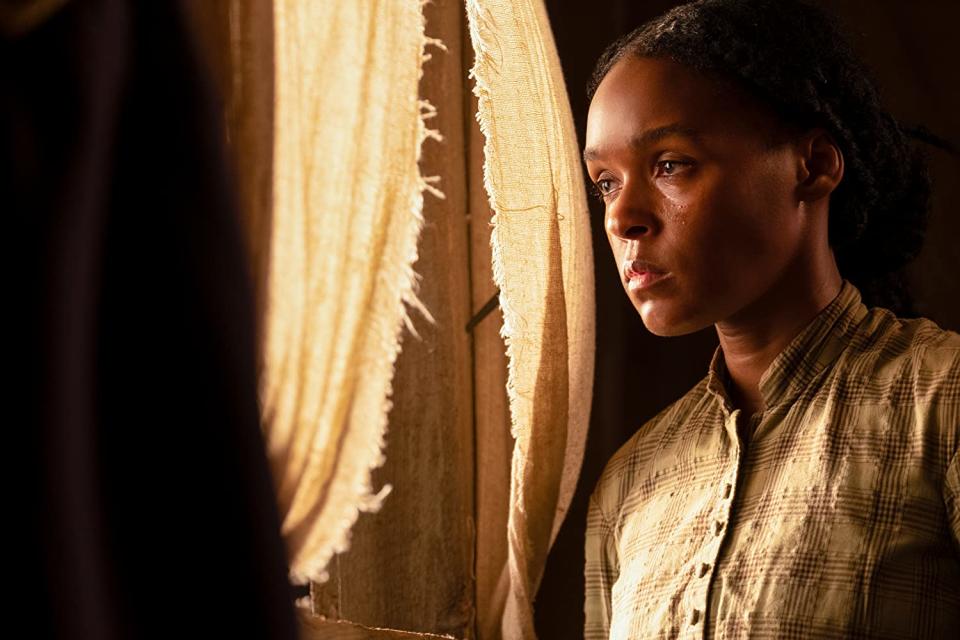Janelle Monáe and the makers of the slavery thriller 'Antebellum' on the film's timeliness — and why 'Gone With the Wind' is a horror movie
The twisty new thriller Antebellum, which finds horror in the dual stories of a slave and contemporary writer, delivers a distinctive and timely emotional punch as it arrives on video on demand four months after the police killing of George Floyd and the subsequent protests across the country.
The film takes place in two separate timelines — one with singer-actress Janelle Monáe (Hidden Figures, Moonlight) as a woman enslaved on a southern plantation, the other with her as a successful social justice author set in the present — as it not so subtly provokes viewers to connect the dots to show how America’s original sin still haunts our present.
Monáe, who was joined by directors Gerard Bush and Christopher Renz and co-stars Kiersey Clemons, Tongayi Chirisa, Gabourey Sidibe, Lily Cowles, Jena Malone and Jack Huston for a recent virtual press junket, relates the film’s messages directly to the current discourse surrounding policing in America.
“The past is not the past,” Monáe tells Yahoo Entertainment (watch above). “When you hear people screaming today, ‘Defund the police,’ ‘abolish the police,’ do the research to understand and know that during the Civil War in the South, the first policing institution was the slave patrol. And that was put into place to chase down runaway slaves, to stop Black people from a revolt. It was meant to terrorize Black people not to protect the people. So we have to understand that those racist policies are with us today.”

“Just the themes of the systems that are in place, the oppression, the suppression, there’s just much of this that’s tied into what’s happening right now,” says Chirisa, who plays the enslaved Eli. “And that’s tied into what happened 400 years ago.”
“This is a movie for now,” says Huston, who plays a Confederate soldier and slave overseer. “It will only help to accelerate and lend a louder voice to the whole movement that’s happening right now, which is the most important movement of our generation. This is history that’s happening right now and I want to be on the right side of history.”
Co-writers and co-directors Bush and Renz tapped directly into a piece of film history to tie the past to the present. They used the actual film lenses from Gone With the Wind, the 1939 epic criticized for its romanticization of slavery and espousing of Black stereotypes in the Civil War- and Reconstruction-era South, to shoot the horrors portrayed in Antebellum. The idea was that “the same weaponry that was used to misinform, we used to correct the record,” Bush says.

“I will say as a Black American that I find the idea of whitewashing the brutality of slavery to be a disservice to the history,” the co-director explains. “When you look at a movie like Gone With the Wind, in my mind, that was a really reckless story, and it was a horror film, and albeit really effective propaganda. From my perspective as a Black American, that was a horror film.”
Monáe agrees: “Gone With the Wind is a horror film. There’s nothing romantic about that era or that period for me and my people.”
The actress extends a similar sentiment to the film’s one-word title, a term that carries similar historical baggage and was recently dropped by the country band formerly known as Lady Antebellum.
“All I think about is my ancestors and I think about how they were stolen, being stolen as property. I’m here because they were forced to be here. I think about slave patrol, and how we lost so many of our ancestors, and justice has never really been served. … Every sense of the word ‘horror,’ that’s what that word represents to me.”
Antebellum premieres Friday, Sept. 18 via on demand services including FandangoNOW, Xfinity and Redbox.
— Video produced by Jen Kucsak
Watch the trailer:
Read more on Yahoo Entertainment:

